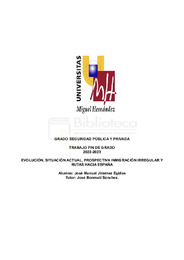Please use this identifier to cite or link to this item:
https://hdl.handle.net/11000/30486Full metadata record
| DC Field | Value | Language |
|---|---|---|
| dc.contributor.advisor | Bonmatí Sánchez, José | - |
| dc.contributor.author | Jiménez Egidos, José Manuel | - |
| dc.contributor.other | Departamentos de la UMH::Ciencia Jurídica | es_ES |
| dc.date.accessioned | 2024-01-09T13:16:33Z | - |
| dc.date.available | 2024-01-09T13:16:33Z | - |
| dc.date.created | 2023-06 | - |
| dc.identifier.uri | https://hdl.handle.net/11000/30486 | - |
| dc.description.abstract | Este trabajo trata sobre la inmigración ilegal que llega a España por vía marítima. En este sentido, se analiza la respuesta desde el punto de vista policial y político, especialmente desde Europa. Desde la Unión Europea se ha realizado una transición desde la visión del problema focalizado en los países receptores a verlo como un punto de inflexión en la existencia de la propia Unión Europea. Por otro lado, se observa la evolución en la doble visión de la inmigración ilegal, visto como como un acto ilícito que debe impedirse pero sin olvidar que detrás hay seres humanos que hay que ayudar sobre la base de los principios de los derechos humanos. Es este sentido, y con la finalidad de implementar la mejor solución posible, han cambiado los medios de lucha contra la inmigración, pasando de afrontarlo directamente en la frontera a utilizar medidas de lucha contra la inmigración en el propio lugar de origen, como es África realizando un especial énfasis en la lucha contras las mafias. Por otro lado, se analizará también el papel de todos estos cambios en la sociedad española, especialmente como consecuencia del papel desarrollado por los medios de comunicación y las organizaciones no gubernamentales. | es_ES |
| dc.description.abstract | This paper deals with illegal immigration arriving to Spain by sea. In this sense, it analyzes the response from the police and political point of view, especially from Europe. The European Union has made a transition from a vision of the problem focused on the receiving countries to seeing it as a turning point in the existence of the European Union itself. On the other hand, there has been an evolution in the double vision of illegal immigration, seen as an illegal act that must be prevented, but without forgetting that behind it there are human beings who must be helped on the basis of the principles of human rights. In this sense, and with the aim of implementing the best possible solution, the means to fight immigration have changed, going from confronting it directly at the border to using measures to fight immigration in the place of origin itself, such as Africa, with special emphasis on the fight against mafias. On the other hand, the role of all these changes in Spanish society will also be analyzed, especially as a consequence of the role played by the media and nongovernmental organizations. | es_ES |
| dc.format | application/pdf | es_ES |
| dc.format.extent | 59 | es_ES |
| dc.language.iso | spa | es_ES |
| dc.publisher | Universidad Miguel Hernández de Elche | es_ES |
| dc.rights | info:eu-repo/semantics/openAccess | es_ES |
| dc.rights | Attribution-NonCommercial-NoDerivatives 4.0 Internacional | * |
| dc.rights.uri | http://creativecommons.org/licenses/by-nc-nd/4.0/ | * |
| dc.subject | Inmigración | es_ES |
| dc.subject | personas | es_ES |
| dc.subject | ONG | es_ES |
| dc.subject | Mafias | es_ES |
| dc.subject | legalidad | es_ES |
| dc.subject.other | CDU::3 - Ciencias sociales::34 - Derecho::343 - Derecho penal. Delitos | es_ES |
| dc.title | Evolución, situación actual, prospectiva inmigración irregular y rutas hacia España | es_ES |
| dc.type | info:eu-repo/semantics/bachelorThesis | es_ES |

View/Open:
TFG INMIGRACION BUENO.pdf
1,47 MB
Adobe PDF
Share:
.png)
